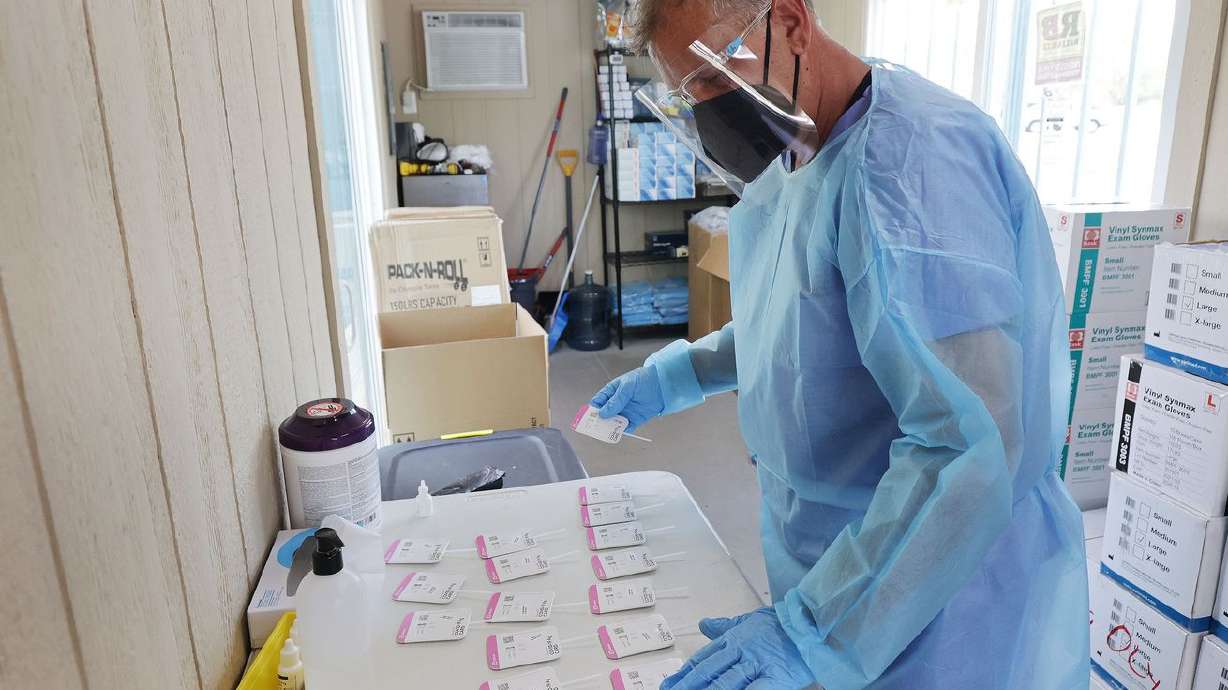Estimated read time: 4-5 minutes
This archived news story is available only for your personal, non-commercial use. Information in the story may be outdated or superseded by additional information. Reading or replaying the story in its archived form does not constitute a republication of the story.
SALT LAKE CITY — There have now been more than 3,000 lives lost in Utah to COVID-19.
The state's death toll from the coronavirus stands at 3,025, with Tuesday's report of 31 additional deaths since last Friday. The Utah Department of Health said there have been 4,366 new COVID-19 cases in the state since Friday, as the number of Utah getting sick every day continues to hover around 1,400.
"The frustration is the folks that we could have possibly saved, who would have been alive if we'd vaccinated a bit more, or been a little bit more diligent about wearing a mask," said Han Kim, a professor of public health at Westminster College in Salt Lake City. "It's those preventable deaths that really haunt us."
Utah recorded 1,000 deaths from COVID-19 early last December, shortly before front-line health care workers and other limited groups received the first vaccines. By March of this year, the death toll had doubled to 2,000 on the first anniversary of the start of the pandemic.
About half of the state's total deaths to date occurred after the vaccines were widely available, Kim said. "I'm not saying those 1,500 would have all been alive today if everybody got vaccinated, but a big, big proportion of that 1,500 would still be here today if we vaccinated the way we should have vaccinated."
Just 53.5% of all Utahns are fully vaccinated, meaning it's been at least two weeks since they received their second dose of the Pfizer or Moderna vaccine, or the single dose of Johnson & Johnson. Adjusted for Utah's younger population compared to the rest of the country, that's still "not great, but middle of the road," Kim said.
Still, the professor said he's "not going to blame folks for not getting vaccinated. I think it's a social failure."
State health department spokesman Tom Hudachko called reaching 3,000 deaths from the virus "tragic."
"Today's data mark another sad milestone in the fight against COVID-19. That 3,025 Utah lives have now been lost to this disease is nothing short of tragic," Hudachko said. "It's also a stark reminder that the pandemic is not over, and that we all need to continue to take the appropriate precautions to protect one another."
Jess Gomez, a spokesman for the region's largest health care provider, Intermountain Healthcare, tweeted Monday Utah was likely to "hit a sad and sobering milestone today: the 3,000th COVID death. That's 3,000 fathers, mothers, sons, daughters, grandparents, uncles, aunts, cousins, friends, neighbors, and co-workers who are gone."
Gomez urged Utahns, "Please get vaccinated so that you're not among them."
He said Tuesday the milestone is "one that we hoped would never be attained, but we continue to work hard to educate people and urge them to be vaccinated. We know that COVID vaccines are safe and effective and the best tool that we have to reduce deaths and severe illness from the virus."
With COVID-19 cases continuing to fill Utah hospitals beyond capacity, Gomez said Intermountain Healthcare hopes "people will continue to be vaccinated to help us get through the coming winter months when we expect to see other respiratory viruses spike, as well."
Doctors have already warned the flu and RSV, or respiratory syncytial virus, may hit hard this winter in Utah after all but disappearing a year ago, when masking social distancing and other measures taken to stop the spread of COVID-19 were mandated.
New COVID-19 treatments, including a five-day course of 40 pills intended to keep someone with the virus from being hospitalized or dying that's awaiting federal approval, may slow the death toll, Kim said. The state recently opened a mobile field hospital to administer an existing treatment, monoclonal antibody infusions.
"We can't really predict what's going to happen with COVID," Kim said, although he sees the disease becoming less deadly as more people develop immunity from vaccinations or having had the disease. "If previous pandemics are any indication, we will reach an equilibrium with the virus. We're not going to get rid of this."









